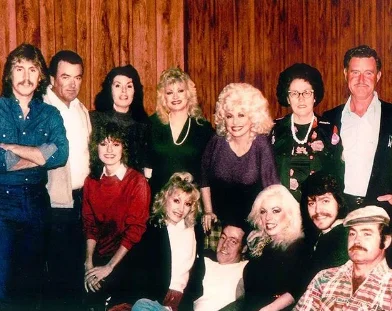Dolly Parton’s Humble Beginnings: Growing Up in a One-Room Cabin and River Baths with a Family of 14
Dolly Parton was raised in a modest shack with 11 siblings, where she experienced hardships such as scarce bathing opportunities. Her father, who was illiterate, nevertheless supported her and their family steadfastly.
Throughout her illustrious career as a musician, businesswoman, and philanthropist, Dolly Parton has maintained her humility. Her upbringing under challenging conditions has imparted a profound awareness of poverty, shaping her into a prominent figure in Hollywood. Despite her vast achievements, she stays true to her humble beginnings and remains down-to-earth.

Born on January 19, 1946, in Sevierville, Tennessee, Dolly Rebecca Parton was raised in a one-bedroom cabin on Locust Ridge, along with her 11 siblings. Her father, Robert Lee Parton, was a sharecropper who also worked in construction to make ends meet. Despite his inability to read or write due to limited educational opportunities, he provided for his family as best he could.
The Partons, though living modestly, were deeply connected to music. In a home where singing was a common joy, Dolly was immersed in a rich musical environment from a young age. Her mother, Avie Lee Owens, herself a performer, taught Dolly to sing and introduced her to a wide range of music, including church hymns and traditional Elizabethan ballads that had been in their family for generations.
Dolly’s grandfather, Jake Robert Owens, a minister, contributed to her musical heritage by composing the hymn “Singing His Praise.” Her interest in music was further encouraged by her uncle, Sam Owens, a musician and songwriter who recognized and nurtured her talent early on, believing in her future success.
Dolly, the fourth of twelve siblings—including Stella Mae, Cassie Nan, twins Freida Estelle and Rachel Ann, Willadeene, David Wilburn, Coy Denver, Bobby Lee, Robert, and Larry—often helped care for her younger brothers and sisters. Tragically, Robert passed away in 2021 after a battle with cancer, and Larry died in infancy. The family’s bond and shared experiences under one roof were foundational to Dolly’s character and career.

At that time, their humble log cabin featured just one bedroom and a living room, devoid of modern conveniences like running water and electricity. Impressively, the cabin still exists today.
Dolly Parton has always been candid about her modest upbringing and the profound impact it had on shaping her outlook on life. Raised in a large family with scant resources, she has a personal understanding of the hardships of poverty.
In a 2016 interview with The Guardian, Parton warmly remembered her childhood in the rural mountains of Tennessee, choosing to focus on the happier memories that brought her joy. She remarked:
“Of course, not everything was perfect, but I prefer to remember the best of times.”
She fondly recalled singing in church with her siblings and even the less pleasant chores. The laughter they shared as a family was a significant aspect of her memories.
Parton recounted how music was a constant in their home, with her often trying to enlist her brothers and sisters as backup singers while she took the lead, although they were generally reluctant.
She described the small cabin as always lively with activity, filled with teasing and squabbling among the siblings. Despite the chaos, their bond remained strong.
Due to the cramped indoor space, they often spent time outside, where they ate meals, entertained themselves, and played games, using the outdoors as an extended living space.
Parton emphasized that her family was consistently grateful for the basics: food on the table and a roof over their heads. Despite not having everything they desired, her parents made it clear that there were others facing even more severe hardships. She reflected:
“We were poor, but I never felt poor.”
From these humble beginnings, Parton’s relentless passion and natural musical talent would eventually launch her to stardom, making her one of the most beloved and successful country music artists in history.
**Enduring Poverty in Childhood** While Parton holds fond memories of her childhood, she acknowledged the harsh realities of growing up in poverty. She lived in a cramped cabin with her family of 14, where basic necessities were a luxury. Despite these challenging conditions, the experiences shaped her resilience and deepened her connection to her roots.

In a 1978 Playboy magazine interview with journalist Lawrence Grobel, Dolly Parton recounted her astonishment at seeing a toilet and bathroom for the first time at eight years old at her aunt’s house, describing the encounter as fascinating.
Parton recalled how she and her siblings, in their innocence and naivety, were initially terrified to use the toilet, fearing it might suck them in, which she found to be a “really weird” experience.
Daily baths were a rarity for Parton and her family, who usually made their own soap. Occasionally, they would pile into a truck and drive to the river for a communal bath.
The family preferred the river over the nearby creek because it felt like a “big bath” that could accommodate everyone. There, they swam, washed each other’s hair, and watched their homemade soap drift away in the water. Dolly once humorously remarked that their bathing could have left a ring around the Little Pigeon River, likening it to a “bathtub.” These river baths became a cherished summertime tradition.
However, winter presented more challenges for bathing. The family used a pan of water to clean themselves as thoroughly as possible. When Lawrence Grobel inquired about their winter bathing routine, Parton responded with humor:
“Well, we bathed once a week, whether we needed it or not, as the saying goes.”
As Parton entered high school, personal hygiene became more crucial, prompting her to bathe every night. This change was partly due to her younger siblings’ bedtime habits, as some would wet the bed, leaving Parton to wash off in the morning before starting her day anew.

Dolly Parton, candidly sharing her childhood experiences, mentioned that although some might find the idea of getting peed on unsanitary, it provided a measure of warmth during the harsh winters in their mountain home. She humorously noted that the warmth was welcome, given that their room was almost as cold as the outside, turning an otherwise unpleasant situation into a source of heat as they huddled together in bed.
Despite the stark conditions of her early years, Parton has often spoken of her family as being joyful and wealthy in ways beyond money. She credits her family life with shaping her musical career and her dedication to philanthropy.
Parton’s financial achievements are notable, with Forbes estimating her net worth at $375 million in 2022. A significant portion of her wealth stems from owning the publishing rights to her extensive song catalog, including the iconic “I Will Always Love You.” Her music has generated substantial royalties from its use in films, broadcasts, and sales, with her songwriting royalties estimated between $6 million and $8 million. Additionally, her popular theme park, Dollywood, and its associated businesses have further bolstered her financial status. Despite her wealth, Parton is renowned for her generous nature and extensive philanthropic work.

Dolly Parton’s financial success includes her renowned theme park, Dollywood, a major draw in Tennessee that nets about $3 million a year. She became involved with the park in 1968, back when it was known as Pigeon Forge, and later rebranded it to “Dollywood.” The park has since grown to include a hotel and a water park.
Driven by her entrepreneurial spirit and love for animals, Parton launched a company named “Doggy Parton,” which specializes in dog toys and clothing.
Parton’s humble beginnings have instilled in her a strong belief in giving back. She has been deeply involved in various charitable endeavors. In 2016, she organized a concert that raised $13 million for the victims of the East Tennessee wildfires, benefiting areas including Pigeon Forge and Gatlinburg. The event featured performances from prominent artists like Chris Stapleton, Kenny Rogers, and Reba McEntire.
Her philanthropy extends to healthcare as well; she donated $1 million to the Monroe Carell Jr. Children’s Hospital at Vanderbilt University Medical Center in Nashville, where her niece was treated for leukemia.
Parton also made headlines in 2020 with her $1 million donation to support COVID-19 vaccine research, which helped fund the development of the Moderna vaccine.
Additionally, Parton is committed to promoting early childhood literacy through her non-profit, the Imagination Library. Motivated by her father’s illiteracy, she co-founded this organization with Robert Lee in 1995. It began in eastern Tennessee and has since expanded nationwide, sending free books to over a million children each month, reaching kids across all 50 states and the District of Columbia.

Dolly Parton’s Imagination Library literacy program has expanded globally, reaching countries like Australia, Canada, and the United Kingdom. In 2018, she proudly announced at the Library of Congress that the program had distributed its 100 millionth book. Initially, Parton launched the initiative to benefit her father and her hometown, never envisioning its immense success. She has since noted that the program took on a life of its own, evolving into a significant educational endeavor.
Parton was particularly pleased that her father lived to see the positive impact of the Imagination Library before he passed away in 2000. She remains ambitious about the program’s future, aiming to distribute one billion books within her lifetime.
Despite a childhood marked by hardships, Parton has always valued the importance of family and community. She leverages her success to make substantial contributions to various causes, including education, healthcare, and disaster relief, donating millions annually. Her early experiences taught her the virtues of hard work, determination, and the cohesive power of music. Reflecting on her life, she cherishes the memories of joy, laughter, and love that permeated her childhood home, and the steadfast support of her family that has accompanied her throughout her journey.



